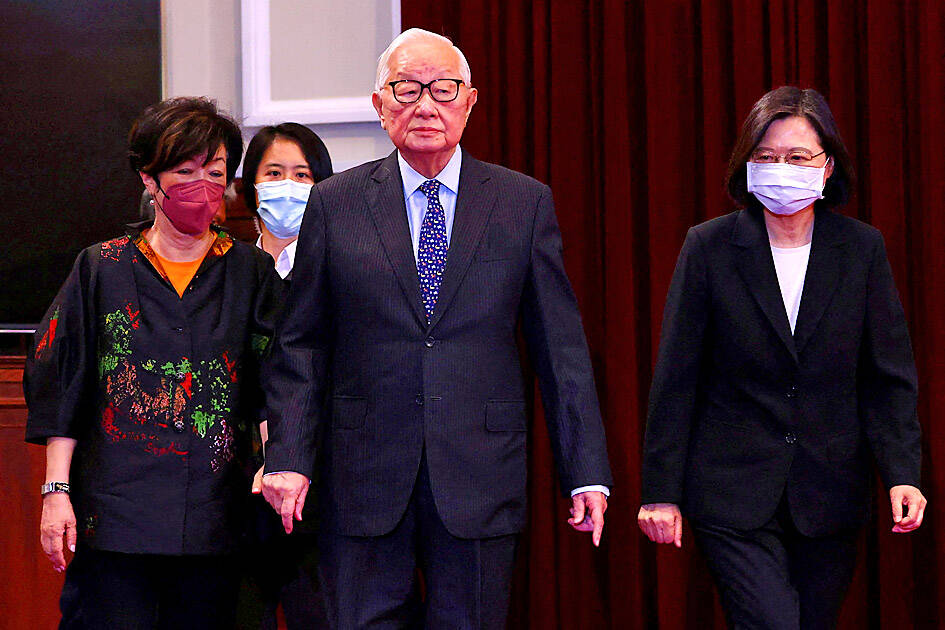Taiwan Semiconductor Manufacturing Co (TSMC, 台積電) founder Morris Chang (張忠謀) is to tout Taiwan’s semiconductor industry at next month’s APEC summit, President Tsai Ing-wen (蔡英文) said yesterday.
Tsai addressed a news conference at the Presidential Office, announcing that Chang would represent Taiwan at the APEC economic leaders’ meeting in Bangkok on Nov. 18 and 19.
Chang would be representing the nation for the sixth time at the summit and the fifth time during Tsai’s administration.

Photo: Ann Wang, Reuters
However, it is only the second summit he would be attending in person, after Chile canceled the 2019 summit due to public unrest, while the past two editions were held online due to the COVID-19 pandemic.
The nation’s presidents are barred from attending APEC summits due to Chinese opposition.
Tsai tasked Chang with conveying three messages to other APEC leaders during the summit, which is also to be attended by US Vice President Kamala Harris and Chinese President Xi Jinping (習近平).
First, Taiwan’s delegation should call on APEC members to recognize “differences of opinion” within the region and seek to strike a balance between free trade and fair competition, as well as between supply chain security and efficacy, and economic development and sustainability, she said.
Second, they should call attention to Taiwan’s “key influence” in global supply chains — especially in semiconductors — while conveying the nation’s willingness to work with regional partners to build safe, reliable and resilient supply chains, Tsai said.
Third, the delegation should express Taiwan’s determination to pursue sustainable economic development while also pushing for a green transition, workers’ welfare, women’s empowerment and social welfare, she added.
Chang told Tsai that he was honored to accept the appointment.
APEC is especially important at this challenging time and is perhaps the most important international forum for Taiwan to attend, he said.
Chang said he would convey Taiwan’s desire to build safe and resilient global supply chains with reliable partners, especially in semiconductors.
He said Taiwan has already done a lot to mitigate the effects of climate change, but it still has a long way to go, adding that the delegation would share Taiwan’s achievements with other nations.
Chang vowed to convey Tsai’s messages to other leaders at the summit, as well as during bilateral meetings and informal events to be held on the sidelines.
Minister Without Portfolio John Deng (鄧振中) and National Development Council Minister Kung Ming-hsin (龔明鑫) are also to attend, the Presidential Office said.

‘WIN-WIN’: The Philippines, and central and eastern European countries are important potential drone cooperation partners, Minister of Foreign Affairs Lin Chia-lung said Minister of Foreign Affairs Lin Chia-lung (林佳龍) in an interview published yesterday confirmed that there are joint ventures between Taiwan and Poland in the drone industry. Lin made the remark in an exclusive interview with the Chinese-language Liberty Times (the Taipei Times’ sister paper). The government-backed Taiwan Excellence Drone International Business Opportunities Alliance and the Polish Chamber of Unmanned Systems on Wednesday last week signed a memorandum of understanding in Poland to develop a “non-China” supply chain for drones and work together on key technologies. Asked if Taiwan prioritized Poland among central and eastern European countries in drone collaboration, Lin

The Chien Feng IV (勁蜂, Mighty Hornet) loitering munition is on track to enter flight tests next month in connection with potential adoption by Taiwanese and US armed forces, a government source said yesterday. The kamikaze drone, which boasts a range of 1,000km, debuted at the Taipei Aerospace and Defense Technology Exhibition in September, the official said on condition of anonymity. The Chungshan Institute of Science and Technology and US-based Kratos Defense jointly developed the platform by leveraging the engine and airframe of the latter’s MQM-178 Firejet target drone, they said. The uncrewed aerial vehicle is designed to utilize an artificial intelligence computer

Renewed border fighting between Thailand and Cambodia showed no signs of abating yesterday, leaving hundreds of thousands of displaced people in both countries living in strained conditions as more flooded into temporary shelters. Reporters on the Thai side of the border heard sounds of outgoing, indirect fire yesterday. About 400,000 people have been evacuated from affected areas in Thailand and about 700 schools closed while fighting was ongoing in four border provinces, said Thai Rear Admiral Surasant Kongsiri, a spokesman for the military. Cambodia evacuated more than 127,000 villagers and closed hundreds of schools, the Thai Ministry of Defense said. Thailand’s military announced that

CABINET APPROVAL: People seeking assisted reproduction must be assessed to determine whether they would be adequate parents, the planned changes say Proposed amendments to the Assisted Reproduction Act (人工生殖法) advanced yesterday by the Executive Yuan would grant married lesbian couples and single women access to legal assisted reproductive services. The proposed revisions are “based on the fundamental principle of respecting women’s reproductive autonomy,” Cabinet spokesperson Michelle Lee (李慧芝) quoted Vice Premier Cheng Li-chiun (鄭麗君), who presided over a Cabinet meeting earlier yesterday, as saying at the briefing. The draft amendment would be submitted to the legislature for review. The Ministry of Health and Welfare, which proposed the amendments, said that experts on children’s rights, gender equality, law and medicine attended cross-disciplinary meetings, adding that